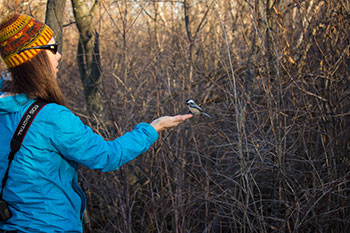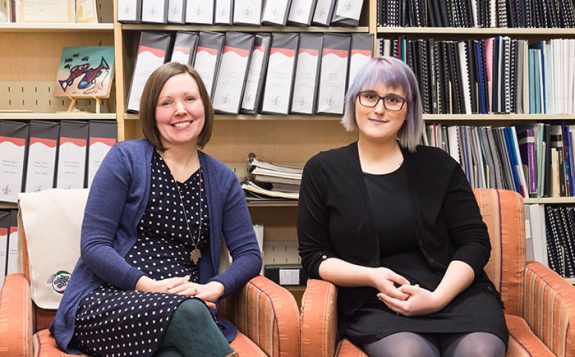Dr. Jennifer Foote has taken the title of bird watcher to an extreme. From studying the sounds, songs, and behavioral habits of the winged species, Foote is in every sense, a bird watcher extraordinaire, who has dedicated her post-secondary studies and academic career to ornithology. Today, she calls Sault Ste. Marie her home, and carries out her research on the fourth floor of Algoma University’s Essar Convergence Centre in a state-of-the-art laboratory.
From Dartmouth, Nova Scotia, Foote earned her Honours Bachelor of Science in Biology from Saint Mary’s University in Halifax, where she was first exposed to the study of birds and ecology through undergraduate thesis supervisor, Dr. Colleen Barber. “I really liked her courses,” begins Foote, sitting in her office. “I liked behavioral ecology, which she had taught. So I approached her about doing an honours thesis, and she said sure why not. She told me about applying for a summer NSERC [National Sciences and Engineering Research Council of Canada] scholarship to work in her lab that summer, which I did and I got. So I showed up for my first day of field work. I didn’t know what a song sparrow looked like or sounded like and had not really watched birds that much, even though my dad had been a bird watcher growing up.”
Luckily for Foote, she discovered quickly how much she enjoyed studying birds, including listening to their songs, and describing their behaviours and nests. Most importantly, this field of research allowed her to be outdoors. “I got hooked instantly, you could say,” she adds with a laugh.
From Saint Mary’s University, Foote ventured down the street to Dalhousie University for her Masters of Science in Biology, still working closely under the supervision of Barber, who has Adjunct status at both post-secondary institutions. For both her undergraduate and Master’s thesis, she examined song sparrows and their vocal behavior. She received another NSERC grant to fund her studies.
Unsure of what she wanted to do after graduation, Foote continued with post-secondary education, this time earning her Ph.D. in Biology from Queen’s University in Kingston, Ontario. Her NSERC funded thesis examined black capped chickadees with supervisor Laurene Ratchliffe. Upon earning her doctorate, Foote earned yet another NSERC grant, this time a post-doctorate grant, allowing her to continue researching with Dan Mennill at the University of Windsor. She also applied to work and teach at various smaller universities. “I applied to a few positions at small universities, and Algoma was one of them. Algoma had a smaller biology program, where I would get to meet the students and it would be much like my own undergraduate experience. After going to Dalhousie and Queen’s and teaching students in labs there, I couldn’t imagine myself teaching in that environment. Not that I couldn’t do it, I just knew I wouldn’t find it as enjoyable to have less personal classes. I was a shy student myself and much preferred the smaller school environment, like the one I had a Saint Mary’s.”
Foote has now been with the Department of Biology at Algoma U for over five years and is currently an Associate Professor. She has found the University, but also Sault Ste. Marie, to be the perfect fit for her academic career and her bird research. “There’s lots of great places to study birds nearby. There’s also not a lot known about the populations here, many of which are doing better here than in other parts of the province. But nobody really knows about it because nobody is studying it. There’s a few ornithologists at the forestry labs but they’re usually working further up in the boreal. As far as Sault Ste. Marie and the surrounding area, there’s some knowledge gaps, which is where my research comes in.”
Having two smaller children, Foote’s bird watching zone is constricted to Sault Ste. Marie and the surrounding area. She does much of her research in Hiawatha Highlands and the historic downtown, but also in nearby Echo Bay.
Currently, she is examining chimney swifts, oven-birds, and other migratory birds. With oven-birds, for example, she and her students are researching vocal behavior. “Oven-birds produce this really elaborate flight song, however, they sing it rarely. They also produce a consistent primary song, which they do often. The rare flight song hasn’t been studied much and we don’t know why they sing it. We have some ideas that it appears more at dusk and dawn. But my students and I have discovered that the birds are also singing it in the middle of the night, just one a time, periodically throughout the night. So we’re interested in why they’re doing that. We’re looking at the functions of that song.”
Foote uses automated recorders that wake up at the sound of a bird’s song. “Without those I would be at a real loss and wouldn’t get much sleep,” she jokes, knowing she would be conducting endless research throughout the night.
Last year, Foote won yet another NSERC grant, a Discovery Grant, valued at $105,000 over five years, to help fund her research, enabling her to purchase and maintain new equipment, but also to hire students and interns to work alongside her in her lab. At the moment, Foote has two graduate students from the University of Windsor and one at Nipissing University, four Algoma U undergraduate students, eight undergraduate volunteers, and two interns through the Northern Ontario Heritage Fund Corporation (NOHFC) working in her labs. The additional help allows Foote to spend less time researching alone and more time supervising others, making her research projects a collaborative, team effort.
Foote will also be using a portion of the Discovery Grant for travel. In August, she will be taking four others with her to the North American Ornithological Conference in Washington, D.C. “This is a great opportunity for them. We have sent some of our students to provincial conferences and only a few of them have been able to travel internationally before. It’s really great to have funding to send our students away and meet others in this field of research. It’s a great networking opportunity.”
Foote is quick to note that the faculty members in the Department of Biology have worked hard to grow the number of opportunities available to their students. “Our department has really worked on growing the number of students in the program and the opportunities for each of the students. I think we’ve been very successful with that. We’re also trying to get students to volunteer more so they can get that Co-Curricular Record credit and hands on experience to help them decide what they’re really interested in.” Foote feels strongly that it’s these kinds of opportunities that set an Algoma degree apart from the rest.
Aside from conducting research, Foote enjoys teaching her students. What she likes best about Algoma U is mentoring students throughout their duration of their studies, from year one to four. “Watching students grow from the start of the program to the end is what I like best about working at Algoma U. You get to know every student personally. It’s really special to also know those students who really struggled with studying or motivation and get really excited and do really well by the end. There’s plenty of students that show consistent performance throughout their degree, but the ones that you see the spark finally ignite and start to pay attention to the course material because they’re excited about it, that’s what it’s all about.”
Foote teaches students in each level of the program, including in fourth year when many are completing their own honours thesis. She’s an avid supporter of thesis work and hopes to see many more students continue to pursue this option of the biology degree in years to come. “The thesis is a huge help regardless of what students are planning on doing. You get skills managing your own project. There’s a fair amount of writing, so you develop writing skills. You have to look up and read a lot of the papers that relate to the project so you learn how to research and look through the literature. So now matter what you’re going to do later on, having skills that show that you can manage a project and finish it and present it, are really important tools for whatever workforce you’re going into, whether you stay in biology or go into something completely different. The skill set from a thesis is very valuable.”
Aside from her work at Algoma U and recently being elected as Councillor for the Society of Ornithologists and is an Associate Editor for the journal The Canada Field-Naturalists. Foote is an avid cross-country skier and has more recently become actively involved in cross-country running. She’s recently committed to be an Assistant Coach for the volunteer organization, Girls Run Strong, which encourages self-esteem building through the sport in girls in public schools from grades three through six.
For more information on Foote’s research, please visit her website.
Share Article




